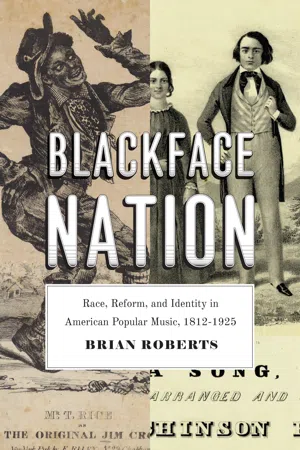
Blackface Nation
Race, Reform, and Identity in American Popular Music, 1812-1925
- English
- ePUB (mobile friendly)
- Available on iOS & Android
About This Book
As the United States transitioned from a rural nation to an urbanized, industrial giant between the War of 1812 and the early twentieth century, ordinary people struggled over the question of what it meant to be American. As Brian Roberts shows in Blackface Nation, this struggle is especially evident in popular culture and the interplay between two specific strains of music: middle-class folk and blackface minstrelsy.The Hutchinson Family Singers, the Northeast's most popular middle-class singing group during the mid-nineteenth century, is perhaps the best example of the first strain of music. The group's songs expressed an American identity rooted in communal values, with lyrics focusing on abolition, women's rights, and socialism. Blackface minstrelsy, on the other hand, emerged out of an audience-based coalition of Northern business elites, Southern slaveholders, and young, white, working-class men, for whom blackface expressed an identity rooted in individual self-expression, anti-intellectualism, and white superiority. Its performers embodied the love-crime version of racism, in which vast swaths of the white public adored African Americans who fit blackface stereotypes even as they used those stereotypes to rationalize white supremacy. By the early twentieth century, the blackface version of the American identity had become a part of America's consumer culture while the Hutchinsons' songs were increasingly regarded as old-fashioned. Blackface Nation elucidates the central irony in America's musical history: much of the music that has been interpreted as black, authentic, and expressive was invented, performed, and enjoyed by people who believed strongly in white superiority. At the same time, the music often depicted as white, repressed, and boringly bourgeois was often socially and racially inclusive, committed to reform, and devoted to challenging the immoralities at the heart of America's capitalist order.
Frequently asked questions
Information
Table of contents
- Cover
- Title Page
- Copyright Page
- Dedication
- Contents
- Acknowledgments
- Introduction
- 1 Carnival
- 2 The Vulgar Republic
- 3 Jim Crow’s Genuine Audience
- 4 Black Song
- 5 Meet the Hutchinsons
- 6 Love Crimes
- 7 The Middle-Class Moment
- 8 Culture Wars
- 9 Black America
- 10 Conclusion: Musical without End
- Notes
- Index